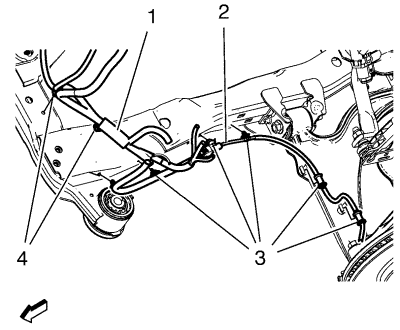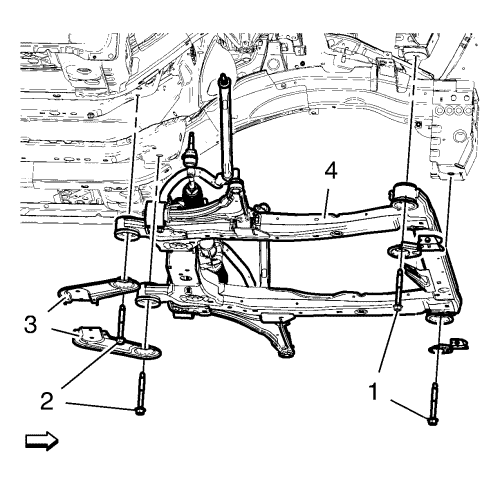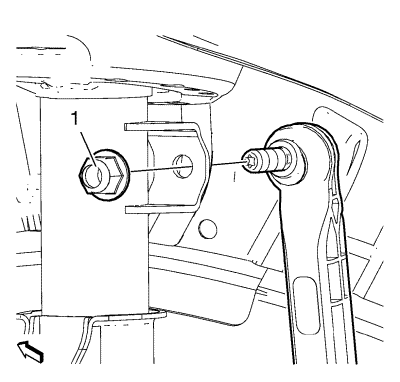- Disable the high voltage system. Refer to High Voltage Disabling .
Caution: With wheels of the vehicle facing straight ahead, secure the steering wheel utilizing steering column anti-rotation pin, steering column lock, or a strap to prevent rotation. Locking of the steering column will prevent damage and a possible malfunction of the SIR system. The steering wheel must be secured in position before disconnecting the following components:
| • | The intermediate shaft(s) |
- Remove the front bumper fascia. Refer to
Front Bumper Fascia Removal and Installation : Volt → Ampera .
- Support the radiator and condenser from above using the condenser tabs on each side.
- Install the engine support fixture. Refer to Engine Support Fixture .
- Remove the lower steering intermediate shaft bolt. Refer to Intermediate Steering Shaft Replacement .
- Raise the vehicle on a hoist. Refer to Lifting and Jacking the Vehicle .
- Remove the catalytic converter. Refer to Catalytic Converter Replacement .

- Remove the wheel speed sensor wiring harness (2) from the frame on both sides.
Remove the wiring harness retainers (3) from the frame and the lower control arm.
- Remove the heater inlet and outlet pipe bolts from frame. Refer to Heater Inlet And Outlet Pipe Replacement .
- Position the heater water auxiliary pump and support to the side. Refer to Heater Water Auxiliary Pump Replacement .
Caution: Electrostatic discharge (ESD) can damage many solid-state electrical components. ESD susceptible components may or may not be labelled with the ESD symbol. Handle all electrical components carefully. Use the following precautions in order to avoid ESD damage:| • | Touch a metal ground point in order to remove your body's static charge before servicing any electronic component; especially after sliding across the vehicle seat. |
| • | Do not touch exposed terminals. Terminals may connect to circuits susceptible the ESD damage. |
| • | Do not allow tools to contact exposed terminals when servicing connectors. |
| • | Do not remove components from their protective packaging until required to do so. |
| • | Avoid the following actions unless required by the diagnostic procedure: |
| - | Jumpering or grounding of the components or connectors. |
| - | Connecting test equipment probes to components or connectors. Connect the earth lead first when using test probes. |
| • | Ground the protective packaging of any component before opening. Do not rest solid-state components on metal workbenches, or on top of TVs, radios, or other electrical devices. |
- Disconnect the electrical connectors from the electronic power steering assembly. Refer to
FEP Connectors : Steering Gear .
- Remove the wire harness bracket and bolt from the power steering gear.
- Remove the lower ball joints from the steering knuckles. Refer to Steering Knuckle Replacement .
- Remove the stabiliser link nut from the strut, then discard the nut. Refer to Stabilizer Shaft Link Replacement .
- Remove the outer track rods and track rod nuts from the steering knuckles. Refer to Steering Linkage Outer Track rod Replacement .
- Remove the rear transmission mount to rear transmission mount bracket through bolt. Refer to Transmission Rear Mount Replacement .
- Lower the vehicle until the drivetrain and front suspension frame contacts the engine support table.

- Remove the frame front bolts (1).
- Remove the frame rear bolts (2).
- Remove the frame reinforcements (3).
- Remove the frame (4) from the vehicle.
- Remove the following components if replacing the frame:
| • | The radiator support brackets |



